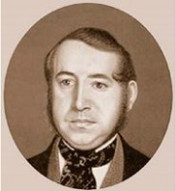
Birthday anniversary of Filipp F. Vigel, memoirist, author of well known memoirs
“It is a person speaking with malice,
proud, touchy, biting and clever”.
A. I. Hertzen
“Vigel’s memoirs are interesting and valuable acquisition for our national and everyday literature;
they are written in a clever manner and sometimes quite artistically. The tale is lively and fascinating”.
P. A. Vyazemsky
12 (23) November 1786 in the village of Uspenskoye (Simbukhino, Simbukhovo), Penza Province (today the village of Kalinino, Penza district, Penza Region) into the family of the General, Penza Governor F. L. Vigel was born Filipp Filippovich Vigel.
Filipp Vigel spent his childhood in Kiev, then lived in Moscow and in the estate of Princes Golitsyns, where he studied Russian literature for some time taught by I. A. Krylov. Having completed his education, Vigel served in the Archives of the Board of Foreign Affairs, numerous departments of the Ministry of Finance, Foreign and Interior Ministries.
In 1824-1826 F. Vigel was the Vice-Governor of Bessarabia, then the Governor of Kerch for two years. Having returned to Petersburg in 1829, he became Director of the Theological Affairs of Foreign Confessions Department. Vigel resigned in 1840 in the rank of the privy councilor which was equal to the rank of lieutenant general.
All his life Filipp Vigel was reputed to be literature and theater connoisseur and was well known for his prints collection. But he became famous for his memoirs which covered the period until 1828. Published in 1864, after the author’s death, the first edition of memoirs was called “Memoirs of Filipp Filippovich Vigel”. After the re-edition in 1928 they were named the “Notes”.
The “Notes”, not always reliable and very subjective, were written in a quite lively and captivating manner. The author remembers his meetings with A. S. Pushkin whom he met during the poet’s exile to the south; many pages are devoted to V. A. Zhukovsky, families of Vyazemsky, Karamzin, Turgenev. The “Notes” also reveal the friendship of the memoirist with M. N. Zagoskin which began in their youth in Penza.
Memoirs of F. F. Vigel cover in detail life of the first quarter of the 19th century: peripeties of war and peace, all rumors and gossips about intrigues and war, disgrace and exile of Speransky, first vague news about the death of the emperor Alexander, Decembrists’ revolt. The “Notes” feature an expansive portrait gallery of Russian people of the first half of the 19th century in the context of everyday life of that time.
The importance of the memoirs of F. F. Vigel can scarcely be overestimated: not without reason they are the most valuable source for researchers of the 19th century.
Not only Vigel gave the most interesting literature sketches of nobles’ everyday life of the early 19th century, but also left a splendid collection of lithographic portraits of his contemporaries which he had been collecting all his life. In 1852 he granted to the Moscow University. In addition to graphic works, Vigel had collected a marvelous library of more than 2, 000 books mostly on history and art.
Filipp Filippovich Vigel died 20 March (1 April) 1856 in Moscow.
Lit.: Вигель Ф. Ф. Записки Филипа Филиповича Вигеля. М.,1892; Савин О. М. Записки Ф. Ф. Вигеля // Сура. 1993. № 3; Инюшкин Н. М. Край Пензенский: люди и судьбы. Пенза, 1997.
The material was delivered by the M. Yu. Lermontov Regional Library of Penza

